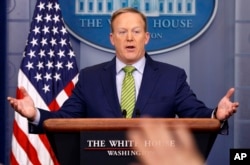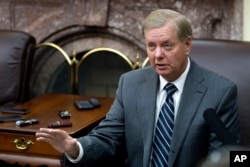Efforts to fix an unintended consequence of recent sanctions against Russia nearly set off a new controversy for the Trump administration, underscoring the high level of anxiety present in relations between Washington and Moscow.
The Treasury Department on Thursday issued a general order titled "Authorizing Certain Transactions with the Federal Security Service," which at first glance appeared to suggest officials were easing sanctions on one of the Russian intelligence agencies thought to be behind efforts to interfere with the 2016 U.S. election.
Adding to the confusion was a series of reports in Russian media, including one from the Russian news agency TASS with the headline "US eases sanctions against Russian Federal Security Service."
"All transactions and activities" with participation of the Russian Federal Security Service — also known by the English initialism FSB — are now authorized, the article said.
Another TASS article quoted former FSB director Nikolai Kovalyov as saying the move "is the first step on the way leading to cooperation in the war on terror" between Russia and the U.S.
Long-planned move
In reality, the move had been in the works for weeks, according to a senior Treasury Department official, aimed at allowing U.S. companies to legally resume exports of cellphones, tablets and software with low-level encryption. Those exports were unintentionally banned when then-President Barack Obama sanctioned the FSB in December.
In addition to its role as an intelligence agency, the FSB also regulates the sale of certain software and hardware. But because of the sanctions, U.S. companies were prohibited from paying the necessary fees.
"These were goods that had already passed muster under this export control regime," said Eric Lorber, a senior associate at the Financial Integrity Network, a strategic advisory firm.
"The only reason that they're being held up in this case was the designation of the FSB," Lorber said, noting there were few other changes to the sanctions.
The order issued Thursday "does not allow U.S. persons to send those goods to the FSB, and generally speaking, it doesn't allow for many other transactions with the FSB, either," he added.
The Treasury Department order caps the amount of fees any one company can pay the FSB at $5,000 a year. But with President Donald Trump having said repeatedly that he would like U.S. relations with Russia to improve, questions remained.
'Not easing anything'
"We're not easing sanctions," White House press secretary Sean Spicer told reporters during Thursday's briefing, defending the move as a "fairly common practice."
A short while later, Trump reiterated the message, telling a group of reporters he was "not easing anything" related to sanctions against Russia.
U.S. intelligence agencies have accused Russia, and the FSB in particular, of hacking computers connected to the Democratic Party as part of a wide-ranging campaign.
"Russia's goals were to undermine public faith in the U.S. democratic process, denigrate [former] Secretary [of State Hillary] Clinton, and harm her electability," according to a declassified report released last month.
Before taking office, Trump repeatedly questioned the intelligence community's findings. Those criticisms have since eased. Still, the president has continued to say publicly that he is open to better relations with Moscow.
Trump and Russian President Vladmir Putin spoke by phone Saturday in what the White House described as "a significant start to improving the relationship between the United States and Russia that is in need of repair."
Still, many in the U.S. remain suspicious of Russia.
Lawmakers on the Senate Judiciary subcommittee on crime and terrorism announced Thursday that they were launching an investigation into Russia's efforts to interfere with the U.S. election, as well as elections in other democratic countries.
"To the fullest extent possible we want to shine a light on Russian activities to undermine democracy," Republican Senator Lindsey Graham of South Carolina and Democratic Senator Sheldon Whitehouse of Rhode Island said in a joint statement.
Allies watching
A number of U.S. allies also remain wary.
"We still give them some time to see what they will do with Russia," a Western diplomatic official told VOA on condition of anonymity, noting that how the U.S. handles the sanctions in place against Russia is of utmost concern.
"We remain vigilant," the official added. "The sanctions are actually the only leverage we have with Russia."
Some close to the Trump administration urge everyone to be patient and to tune out some of the views about closer ties between the U.S. and Russia that have been coming out of Moscow.
"I think the Russians are a bit overly optimistic," said Tony Shaffer, a retired intelligence officer who worked with Trump's national security adviser, retired Lieutenant General Michael Flynn.
"I'm not sure if the White House has had sufficient time to develop a cohesive strategy," he said, but he cautioned that U.S. military exercises and other operations were sending a strong signal that the Trump administration will be tough.
"You do actually see that there are a number of global operations ongoing that are designed to essentially send strategic messages to the Russians," he said.
VOA White House Correspondent Cindy Saine contributed to this report.






